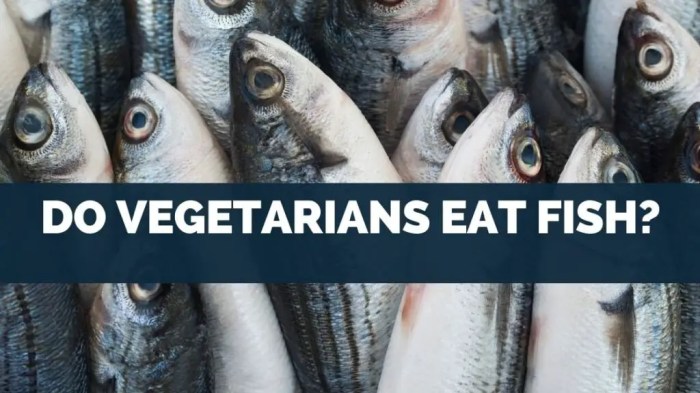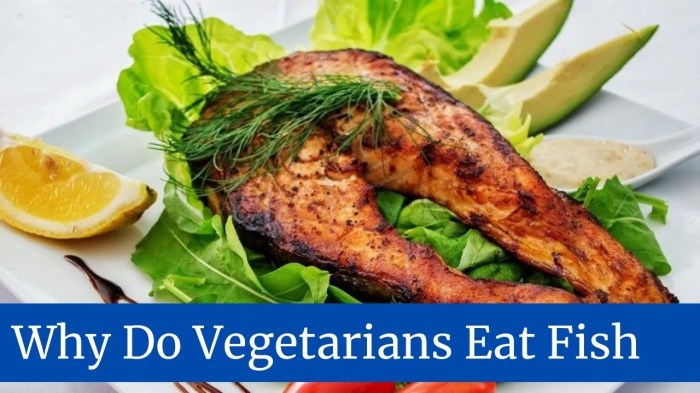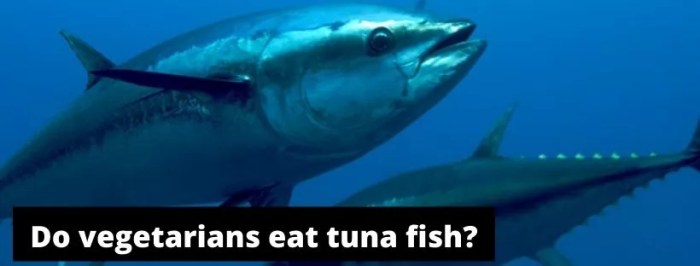Do some vegetarians eat fish? The answer to this intriguing question lies at the intersection of dietary choices, ethical considerations, and the complexities of food classification. Pescatarianism, a unique dietary approach, blurs the lines between vegetarianism and meat consumption, raising fascinating questions about its implications and the nuances of dietary preferences.
This article delves into the world of pescatarianism, exploring its definition, motivations, nutritional considerations, and environmental and social impacts. We will uncover the reasons why some individuals choose to include fish in their vegetarian diets and examine the potential benefits and risks associated with this dietary approach.
Definition of Vegetarianism

Vegetarianism is a type of diet that excludes meat (red meat, poultry, and seafood) and all animal products derived from slaughtered animals. Vegetarians do not consume animal flesh, organs, or glands, and they typically avoid foods that contain animal-derived ingredients like gelatin, animal-based rennet, and animal-derived enzymes.
Common Vegetarian Diets
There are several types of vegetarian diets, each with varying levels of restriction on animal products:
- Lacto-vegetarian:Consumes dairy products like milk, cheese, yogurt, and butter, but excludes eggs and other animal products.
- Ovo-vegetarian:Consumes eggs but excludes dairy products and other animal products.
- Lacto-ovo vegetarian:Consumes both dairy products and eggs, but excludes other animal products.
- Pescatarian:Consumes fish and other seafood, but excludes all other animal products.
- Vegan:The most restrictive type of vegetarian diet, excludes all animal products, including meat, poultry, seafood, eggs, dairy products, honey, and other animal-derived ingredients.
Pescatarianism
Pescatarianism is a type of vegetarian diet that includes fish and other seafood but excludes meat, poultry, and eggs. Pescatarians choose this diet for various reasons, including health, environmental, or ethical concerns. Unlike vegetarians, pescatarians consume fish and other seafood, which are rich in omega-3 fatty acids, iodine, and vitamin D.
Pescatarian meals often include a variety of seafood dishes, such as grilled salmon, tuna salad, or sushi. Pescatarians also enjoy plant-based foods like fruits, vegetables, legumes, and whole grains to ensure a balanced and nutritious diet.
Examples of Pescatarian Meals
- Grilled salmon with roasted vegetables and quinoa
- Tuna salad sandwich on whole-wheat bread with lettuce and tomato
- Sushi with brown rice and avocado
- Baked tilapia with steamed broccoli and sweet potato
- Lentil soup with grilled shrimp
Reasons for Vegetarianism and Pescatarianism
Vegetarianism and pescatarianism are two dietary choices that have gained popularity in recent years. People adopt these diets for various reasons, including ethical concerns, environmental sustainability, and health benefits.
Ethical Reasons
- Vegetarianism:Many vegetarians believe that it is wrong to kill animals for food. They argue that animals are sentient beings who deserve to live and that killing them for food is cruel and unnecessary.
- Pescatarianism:Pescatarians, on the other hand, believe that it is acceptable to eat fish because they are lower on the food chain and do not have the same level of sentience as mammals and birds.
Environmental Reasons
- Vegetarianism:Meat production has a significant environmental impact. It requires large amounts of land, water, and energy, and it contributes to greenhouse gas emissions. Vegetarianism helps to reduce these impacts by eliminating the demand for meat.
- Pescatarianism:While fish production has a lower environmental impact than meat production, it still contributes to overfishing and pollution. Pescatarianism helps to reduce these impacts by promoting sustainable fishing practices.
Health Reasons, Do some vegetarians eat fish
- Vegetarianism:Vegetarian diets are typically high in fruits, vegetables, and whole grains, which are all nutrient-rich foods. Vegetarians have a lower risk of heart disease, stroke, type 2 diabetes, and some types of cancer.
- Pescatarianism:Pescatarian diets share many of the same health benefits as vegetarian diets. However, fish is a good source of omega-3 fatty acids, which are important for heart health. Pescatarians have a lower risk of heart disease and stroke than meat-eaters.
Motivations for Choosing Fish Over Meat
- Health:Fish is a good source of protein, omega-3 fatty acids, and other nutrients. It is a healthier choice than red meat or processed meat.
- Taste:Many people enjoy the taste of fish. It is a versatile food that can be cooked in a variety of ways.
- Sustainability:Fish is a more sustainable choice than meat. It has a lower environmental impact and it is a renewable resource.
Nutritional Considerations

When comparing the nutritional content of vegetarian, pescatarian, and non-vegetarian diets, it’s important to consider the specific foods consumed within each category. In general, all three diets can provide adequate nutrients when planned and executed properly.
Vegetarian and pescatarian diets tend to be higher in fiber, vitamins, minerals, and antioxidants than non-vegetarian diets. However, they may be lower in certain nutrients such as protein, iron, and vitamin B12. Non-vegetarian diets, on the other hand, typically provide more protein and iron but may be lower in fiber and certain vitamins.
Protein
Protein is essential for building and repairing tissues. Vegetarian and pescatarian diets can provide adequate protein if a variety of protein-rich foods are consumed. Good sources of protein for vegetarians include beans, lentils, tofu, tempeh, nuts, and seeds. Pescatarians can also include fish and seafood in their diet for additional protein.
Iron
Iron is important for carrying oxygen throughout the body. Vegetarian and pescatarian diets may be lower in iron than non-vegetarian diets. Good sources of iron for vegetarians include fortified cereals, beans, lentils, and leafy green vegetables. Pescatarians can also include fish and seafood in their diet for additional iron.
Vitamin B12
Vitamin B12 is essential for the nervous system and blood cells. Vegetarian diets do not contain any vitamin B12, so vegetarians must get it from fortified foods or supplements. Pescatarians can get vitamin B12 from fish and seafood.
Health Benefits and Risks
Vegetarian and pescatarian diets offer various health benefits, including a reduced risk of heart disease and certain types of cancer. These diets are rich in fruits, vegetables, and whole grains, which provide essential nutrients like fiber, antioxidants, and vitamins.
If you’re looking for a healthier lifestyle, consider adopting a vegetarian diet. With vegetarian diet meals , you can reduce your risk of heart disease, stroke, and certain types of cancer. Plus, you’ll be doing your part to protect the environment.
Potential Health Benefits
Reduced risk of heart disease
Vegetarian and pescatarian diets are typically low in saturated fat and cholesterol, which can help lower the risk of heart disease.
Reduced risk of certain types of cancer
Studies have shown that vegetarians and pescatarians have a lower risk of developing certain types of cancer, such as colon cancer, prostate cancer, and breast cancer.
Improved blood sugar control
Vegetarian and pescatarian diets are often high in fiber, which can help slow down the absorption of sugar into the bloodstream, improving blood sugar control.
Lower blood pressure
Adopting a plant-based diet can be a healthy and sustainable choice. Vegetarian diet meals are packed with nutrients, antioxidants, and fiber, providing numerous health benefits. Whether you’re seeking to reduce your environmental impact or improve your overall well-being, incorporating more plant-based meals into your diet can be a rewarding endeavor.
Vegetarian and pescatarian diets are typically high in potassium and low in sodium, which can help lower blood pressure.
Environmental Impact: Do Some Vegetarians Eat Fish

Reducing meat consumption offers significant environmental benefits, primarily due to the reduced greenhouse gas emissions and water usage associated with animal agriculture.
Greenhouse Gas Emissions
Animal agriculture is a major contributor to greenhouse gas emissions, particularly methane and nitrous oxide. Methane is released from the digestive systems of ruminant animals like cows, while nitrous oxide is produced from the decomposition of animal manure. These gases trap heat in the atmosphere, contributing to climate change.
Reducing meat consumption helps mitigate these emissions by decreasing the demand for animal products and the associated agricultural practices.
Water Usage
Livestock production requires substantial amounts of water for drinking, feed production, and waste management. The water footprint of animal products is significantly higher than that of plant-based foods. By choosing a vegetarian or pescatarian diet, individuals can conserve water resources and reduce their environmental impact.
Comparison of Diets
Compared to non-vegetarian diets, vegetarian and pescatarian diets have a lower environmental footprint. Vegetarian diets eliminate the greenhouse gas emissions and water usage associated with meat production, while pescatarian diets reduce these impacts by excluding red meat and poultry. However, it’s important to note that fish farming can also contribute to environmental concerns, such as water pollution and habitat degradation.
Summary
In conclusion, the question of whether some vegetarians eat fish is a complex one, with no straightforward answer. Pescatarianism, a hybrid dietary approach, presents a unique perspective on vegetarianism, challenging traditional definitions and offering a nuanced understanding of food choices.
Whether motivated by ethical concerns, environmental sustainability, or personal preferences, pescatarians navigate a path that blends the principles of vegetarianism with the inclusion of fish.
As dietary choices continue to evolve, pescatarianism remains a compelling option for those seeking a balanced and sustainable approach to nutrition. It offers a bridge between vegetarianism and meat consumption, allowing individuals to explore the benefits of plant-based diets while incorporating the nutritional value of fish.
FAQ Guide
What is the main difference between vegetarianism and pescatarianism?
The primary distinction lies in the inclusion of fish and other seafood in the diet. Vegetarians abstain from all meat, including fish, while pescatarians incorporate fish and seafood into their otherwise vegetarian diets.
Are there any health benefits to following a pescatarian diet?
Yes, pescatarians may benefit from reduced risks of heart disease, stroke, and certain types of cancer. Fish is a rich source of omega-3 fatty acids, which have anti-inflammatory properties.
Is pescatarianism an environmentally sustainable dietary choice?
Compared to meat-heavy diets, pescatarianism has a lower environmental impact. Fish production generally requires less land, water, and energy than畜牧业.